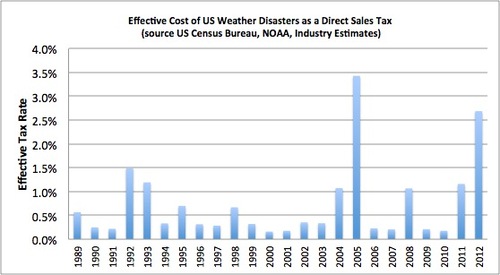American Consumers Are Paying a Climate Disruption Tax of 2.7%
Peter Lehner’s Blog
Posted March 13, 2013 in Solving Global Warming, U.S. Law and Policy
In South Dakota, voters recently rejected a one-penny increase in sales tax. “I feel we’re taxed enough already,” explained Kristi Schnider, a 35-year-old assistant manager at Applebee’s, to the Argus Leader.
The irony is that South Dakota residents are being hit with another, far greater, hidden tax—the cost of climate disruption. Last year’s prolonged and severe drought, which reduced corn yields by 18 percent and led ranchers to sell off their cattle and sheep, cost the state an estimated $1.7 billion. That cost would be the equivalent of tripling South Dakota’s sales tax rate, from 4 percent to more than 12 percent--a far greater hurt than that politically unachievable penny. And last year’s extreme weather wasn’t confined to South Dakota. It hit nearly every state in the nation, with a cost equivalent to raising sales tax rates across the country by an average of 2.7 percentage points.
This is the fine print of climate change—the part of the deal that really hurts, but no one wants to talk about.
Extreme weather in 2012 was remarkable not just for its economic and emotional toll, but for the fact that few states were left untouched, whether from the drought that scorched just about everything west of the Mississippi, to tornadoes in the plains, wildfires in the West, and hurricanes in the South and Northeast. Extreme weather damages reached a total of nearly $140 billion nationwide last year, according to insurer AON-Benfield, shaving about 1 percent off our total GDP. (While scientists can’t directly attribute a particular storm to climate change, we do know that carbon pollution fuels extreme weather, and we’re seeing an awful lot of it.)
If the total cost of climate disruption in 2012 were paid in each state like a sales tax--my colleagues Dan Lashof and Andy Stevenson have done the math—it would add an extra 2.7 percent, on average, to the bill for every purchase made in every state.
At least sales tax revenues are revenues—they help states fund basic services for residents. States cover about 30 percent of their budgets through sales tax. But the climate disruption tax won’t fix any potholes, build new elementary schools, or help pay medical bills. It’s a dead loss that helps no one. In fact, paying to rebuild washed out roads, dig out from under a blizzard, or evacuate endangered residents is a huge burden on local and state budgets (I can attest to this from nearly two decades of experience in state and local government).
This is the price we are paying for decades of inaction on climate change. As the planet continues to warm, these extreme weather events are becoming more frequent, and they will continue to take a toll on American taxpayers.
© Natural Resources Defense Council
http://switchboard.nrdc.org/blogs/plehner/american_consumers_pay_climate.html
